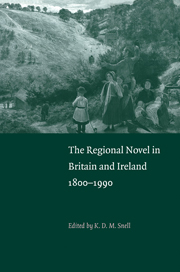Book contents
- Frontmatter
- Contents
- Preface and acknowledgements
- 1 The regional novel: themes for interdisciplinary research
- 2 Regionalism and nationalism: Maria Edgeworth, Walter Scott and the definition of Britishness
- 3 The deep romance of Manchester: Gaskell's ‘Mary Barton’
- 4 Geographies of Hardy's Wessex
- 5 Gender and Cornwall: Charles Kingsley to Daphne du Maurier
- 6 James Joyce and mythic realism
- 7 Cookson, Chaplin and Common: three northern writers in 1951
- 8 Emyr Humphreys: regional novelist?
- 9 Scotland and the regional novel
- 10 Mapping the modern city: Alan Sillitoe's Nottingham novels
- Index
3 - The deep romance of Manchester: Gaskell's ‘Mary Barton’
Published online by Cambridge University Press: 18 December 2009
- Frontmatter
- Contents
- Preface and acknowledgements
- 1 The regional novel: themes for interdisciplinary research
- 2 Regionalism and nationalism: Maria Edgeworth, Walter Scott and the definition of Britishness
- 3 The deep romance of Manchester: Gaskell's ‘Mary Barton’
- 4 Geographies of Hardy's Wessex
- 5 Gender and Cornwall: Charles Kingsley to Daphne du Maurier
- 6 James Joyce and mythic realism
- 7 Cookson, Chaplin and Common: three northern writers in 1951
- 8 Emyr Humphreys: regional novelist?
- 9 Scotland and the regional novel
- 10 Mapping the modern city: Alan Sillitoe's Nottingham novels
- Index
Summary
LIVING IN MANCHESTER
Elizabeth Gaskell's first novel, Mary Barton (1848), might seem to be determinedly regionalised or localised: it claims a local character for itself in its sub-title, A Tale of Manchester Life, and in the copious use of Lancashire dialect, supplemented and weighted with explanatory foot-notes. Elizabeth Gaskell explained in her Preface that:
Three years ago I became anxious (from circumstances that need not be more fully alluded to) to employ myself in writing a work of fiction. Living in Manchester, but with a deep relish and fond admiration for the country, my first thought was to find a frame-work for my story in some rural scene; and I had already made a little progress in a tale, the period of which was more than a century ago, and the place on the borders of Yorkshire, when I bethought me how deep might be the romance in the lives of some of those who elbowed me daily in the busy streets of the town in which I resided. (p. xxxv)
These opening sentences emphasise that what Gaskell wanted to write, as a result of her personal circumstances, was what might readily be defined as a regional novel, a novel set ‘on the borders’, beyond the purview of the metropolis. Yet the phrase, ‘Living in Manchester’, hangs oddly, perhaps ambiguously, in this account of the narrator's intentions: it might implicitly justify that ‘first thought’, of finding a frame in rural Yorkshire, as the result of living in urban Lancashire.
- Type
- Chapter
- Information
- The Regional Novel in Britain and Ireland1800–1990, pp. 78 - 98Publisher: Cambridge University PressPrint publication year: 1998



